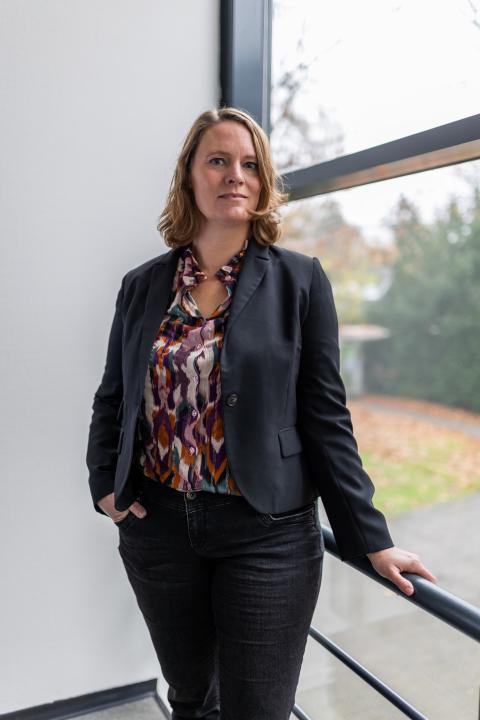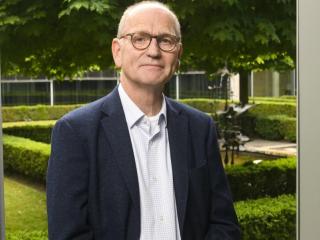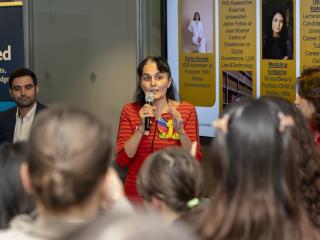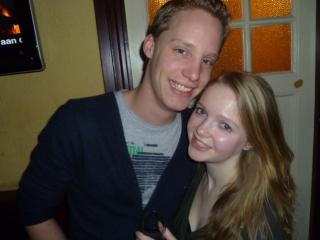“If you want to innovate, you must dare to think wild thoughts”
In August, Emely de Vet started her job as the new Dean of University College Tilburg: the place that brings together lecturers from all of the Schools to provide interdisciplinary education to Bachelor’s students of Liberal Arts and Sciences. What experience and personality traits does Emely bring to the job? And how does she envisage the future for University College? “I’m passionate about creating and getting things moving.”
Before Emely de Vet made the move to Tilburg, she worked as a professor and head of the Consumption and Healthy Lifestyles chair group at Wageningen University. Her work there involved linking together different academic disciplines, shaping interdisciplinary study programs and advising municipalities, ministries and parliament. So what will this academic all-rounder bring to University College Tilburg?
Making the world better and fairer
“All of the work I’ve done so far has been motivated by the same mission: making the world better and fairer through research and education. My research interests cover such areas as food security, poverty, climate change and health, seen from an interdisciplinary perspective. I like my work to have an impact. One way of doing that is to educate people who can apply knowledge and skills around themes of this kind in their own field of work, thereby acting as bridge builders. As the Dean of University College Tilburg, I would like to contribute to that.
The position also allows me to do new things. At Wageningen University & Research, I brought the social sciences and life sciences together. Tilburg University provides an opportunity to forge links within and between other sciences, such as between the social sciences and humanities. Expertise in these disciplines is in much greater supply here.”

Interdisciplinary learning is a bit like chemistry: mix two chemicals together, each with their own properties, and the result is something substantially different. That's where it starts to get exciting.
Approaching work from a wide perspective
When asked what personality traits she brings with her, Emely replies that she is goal-oriented, energetic and progressive and enjoys approaching her work from a wide perspective. “I’m passionate about creating and getting things moving. My determination to pursue long-term goals and my natural optimism enable me to inspire others and get things done.”
In response to how Emely plans to make her mark on University College Tilburg, the Dean expresses a desire to see more interdisciplinarity in the program. “Interdisciplinary learning goes a step further than multidisciplinary learning. It’s a bit like chemistry: mix two chemicals together, each with their own properties, and the result is something substantially different. That's where it starts to get exciting.
I’d also like to see greater attention paid to societal themes, such as climate change, migration and improving health and well-being, perhaps by means of a focus on the Sustainable Development Goals. These complex challenges inevitably call for an integrated approach. In its Liberal Arts and Sciences Bachelor’s program, University College can link together knowledge on these themes from the different Schools.
The study program is also ideally suited for collaboration with wider civil society. That moves you closer to transdisciplinary education, involving a range of different stakeholders, such as companies, policy officers and those who put policy into practice.”
If you innovate and experiment, you also need to make sure you evaluate any benefits and only put into practice what works
Space for experimentation and innovation
“The University College is the perfect place for innovation and experimentation and trying out new forms of teaching”, says Emely. She hopes to be able to ensure that there is even more space for this. “It’s possible to have a very clearly-predefined program, but that can prevent pioneering, especially when new insights emerge in a specific domain. The university distinguishes itself from universities of applied sciences by connecting education to academic research. Academic knowledge is developing all the time and it’s important that your students are exposed to the most recent scientific insights. However, if you do innovate and experiment, you also need to make sure you evaluate any benefits and only put into practice what works. Educational innovation isn’t an end in itself, so you always need to check that it’s actually improving learning outcomes.”
Emely would also like to see more balance in the contribution made to the Bachelor’s program in Liberal Arts and Sciences by the different Schools. “University College Tilburg operates through a matrix structure with a core team and lecturers from the different Schools. This collaborative approach is something we need to nurture and embed more effectively. Not all Schools are equally represented in the program. Ideally, I'd like to see the different Schools all make an equal contribution, with lecturers who embrace the University College philosophy. That's how you develop a real community. If that appeals to lecturers, they need to be given space for it. And vice versa, we need to make contributing to the program attractive for the Schools as well. I warmly invite anyone interested in contributing ideas about this to get in touch with me.”
Finally, the new Dean is convinced that the Liberal Arts and Sciences program should focus even more on small-scale and intensive education, a characteristic feature of the program. “There are various ways of approaching that, including applying such methods as challenge-based learning.”
You need a wide range of interests to forge connections and learn in an interdisciplinary way: you need to be determined to delve deeper all the time, exploring different perspectives and looking beyond your own boundaries
Encouraging wide-ranging interests
How would Emely describe the DNA of students and lecturers at the University College? “Our students are motivated, have wide-ranging interests, are hard-working and socially engaged. They’re inspired by an intrinsic motivation to learn. Students with a wide range of interests can often find it difficult to choose. This is sometimes seen as a problem, whereas I believe that it's important to actively encourage a wide range of interests. You need a wide range of interests to forge connections and learn in an interdisciplinary way: you need to be determined to delve deeper all the time, exploring different perspectives and looking beyond your own boundaries.
Currently, the Liberal Arts and Sciences program seems a bit caught between two opposing ideas: generalist and specialist. I believe that we could actually do more to encourage that generalist approach. We can help students understand that it’s fine not to make a choice and to base your work on a wide range of interests. They then learn to develop a tolerance for uncertainty, to deal with what you don’t yet know, and to be curious about different perspectives: important assets for understanding and changing complex issues. That skill and the ability to see things beyond boundaries and build bridges sets Liberal Arts students apart from others.”
“If you’re determined to innovate, you need to allow yourself the space to think wild thoughts and think freely. This is easier when you say ‘if we were to start everything fresh from scratch, what would it look like?’
Focus on inclusion
“What I think is really unique about University College Tilburg, is the value attached to inclusivity, both by lecturers and students”, adds Emely. “Just like other University Colleges, we are able to select the students. At Tilburg, we aim to achieve output excellence rather than input excellence, which really makes us stand out. We could also make greater efforts to attract students with strong development potential who are currently underrepresented here, such as first-generation students. This is also in line with the university's regional efforts to promote equal opportunities. We’d like to see the same inclusion at lecturer level: appealing to lecturers outside the existing network to become involved in the University College. The issue of inclusion also relates to academic content, such as a focus on non-Western perspectives. Ideally, we’d like to see inclusion reflected in every aspect of the program.”
Dare to think wild thoughts
It may seem rather presumptuous to ask a Dean who was only appointed in August 2023 for her views on the ideal position for the University College in five years’ time. However, Emely has no problems answering the question. “If you’re determined to innovate, you need to allow yourself the space to think wild thoughts and think freely. This is easier when you say ‘if we were to start everything fresh from scratch, what would it look like?’ You need the whole organization for that kind of process. If it was up to me, in five years’ time University College Tilburg and its Liberal Arts and Sciences Bachelor’s program would be significantly more interdisciplinary and have a greater focus on societal challenges. But I actually see it as a joint effort, working together as an organization in pursuit of a shared objective: delivering high quality education. I’d also like us to become more of a breeding ground for ideas, a place where people can experiment and have the confidence to do so. In that process, I'd like us to be agile and future-proof, easily able to adapt our program based on new research, developments in society and wider issues.”
Date of publication: 13 December 2023



